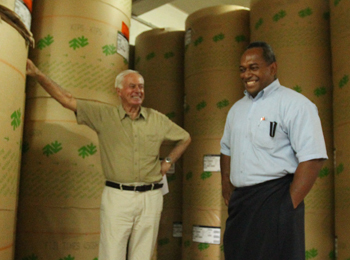
New Fiji Times publisher Dallas Swinstead talks censorship, sackings and the sale of the country’s oldest newspaper when some thought it might close. He speaks to Rebecca Leaver of PANPA Bulletin.
How are you going to manage the government censorship at the Fiji Times?
Free speech is very expensive here – ask News Ltd.
The past retaliation from this paper to the government censorship brought down censorship harshly on all media. It has been an unpleasant journey.
It’s breathtakingly simple to overcome. If you want to run a business – and a newspaper is a business – you can get on with the task at hand or you can stand on your dignity and say goodbye – it’s really that simple.
I would hope that now they (the interim government) will begin to treat this local company as they treat all local companies: equally and without restriction. So hopefully they will learn to live with a press which is in step with them but will criticise from time to time.
What was your biggest challenge coming to the Fiji Times?
My biggest challenge was reaching a position where I could say the newspaper was in safe waters.
My toughest job was to sit down with (former editor) Netani Rika – and we did it over a period of time in a series of in-depth conversations – and eventually he said, ‘I am going to make the sacrifice and offer you my resignation’.
My biggest challenge fell into my lap there and then.
What will follow will be that the government will respond much better to us. Netani has been a terrific presence around the newsroom who worked closely with his owners, News Ltd, who obviously believe in a free press.
As I have said, it (a free press) doesn't work here. Netani took on the government and that was not wise or constructive. Netani was so against the government that it cost News Ltd the newspaper.
News Ltd supported his right to free speech. Of course it did – it had no option and it paid the price.
What do you think the government is trying to achieve through censoring the media?
Prime Minister Frank Bainimarama is a Fijian working towards sharing his country with Indians. Not every Fijian likes that. The PM knows it must happen or the place is doomed; too many good Indians and others have deserted the place. I strongly agree with the PM’s intentions and my paper will do what we can to achieve a means to a beginning and a nation of free speech.
Why do you think the censorship was brought in initially?
The censorship was to stop unfair criticism, incessant criticism, insistent, persistent criticism of the government.
With anything the government did, there was a chance it would get a belting from the Fiji Times. The Fiji Sun doesn’t belt the government – and now they are inundated with all their advertising.
It happened because the papers – or this paper – gave the government a rotten time.
It’s hard to accuse News Ltd of that. The censorship is unbelievably stifling but a fact of life. If we are to do a job and continue to exist we have to find a way of removing the censor. The only way is to argue sensibly about the news we print.
Where do you hope to take the paper?
For all of its political turbulence over the past two decades, there is an amazing peace and serenity on the streets. What I am absolutely dedicated to is turning the Fiji Times into a newspaper which will help the government go down the track it wants; the path most of the people here agree is the right path to go down.
If persistently say ‘this is not fair’ and ‘you should do this’ and ‘you should do that’, they will squeeze us to death.
Can you tell me a little about your new editor, Fred Wesley?
Fred is an imposing figure – early 40s – and was the former editor of the Sunday Times (The Fiji Times Sunday sister). He has a keen interest in marketing and understands demographics.
He is a complete newspaper man.
He has impressed me with his understanding of where we are – that is, we can't function here by kicking the government around. The government has hurt the Fiji Times severely and they are happy about that. I would like to think it’s all over now because Fred understands the role of the press. But he knows the current policies of the Bainimarama government are the only way Fiji can go.
You were the publisher of the Fiji Times in 1976. What have been the biggest changes since then?
They were the golden years. I came here and it was a very important paper.
As I left Fiji, I thought how sad it was that this country, which has so much going for it, except that it has the insoluble problem of two totally different races (Fijian and Indian) which had been ignored for many years.
The difference now is that Bainimarama says these people are going to get along together.
The Australian press and the Australian government say: "You can’t do that – you can’t have a gun barrel government". But they are wrong, it is the only way.
There has to be a change here. You can see that there is agreement even by those who detest censorship and anything but democracy – they understand that this is the only way to go. - PANPA Bulletin/Pacific Media Watch



